- Home
- Michael Dobbs
The Final Cut Page 2
The Final Cut Read online
Page 2
'What'll they do if they catch us, George? Whip us?' Eurypides had heard dream-churning tales of how the British thrashed boys they believed were helping EOKA, a soldier clinging to each limb and a fifth supplying the whipping with a thin, ripping rod of bamboo. It was like no punishment they received at school, one you could get up and walk away from. With the Tommies, you were fortunate to be able to crawl, it was said.
'They'll torture us to find out where we're taking the guns, where the men are hiding,' George whispered through dried lips. They both knew what that meant. An EOKA hide had been uncovered near a neighbouring village just before the winter snows had arrived. Eight men were cut down in the attack. The ninth, and sole survivor, not yet twenty, had been hanged at Nicosia Gaol the previous week.
They both thought of their elder brother.
'Can't let ourselves be captured, George. Mustn't tell.' Eurypides was calm and to the point. He had always been less excitable than George and more focused, the brains of the family, the one with prospects. There was even talk of his staying at school beyond the summer, going off to the Pankyprion Gymnasium in the capital and later becoming a teacher, even a civil servant in the colonial administration. If there were still to be a colonial administration.
They lay as silently as possible, ignoring the ants and flies, trying to melt into the hot stone. It was twelve minutes before they heard the voices.
'They disappeared beyond those rocks over there, Corporal. Hav’nae seen hide nor hair o' them since.'
George struggled to control the fear which had clamped its jaws around his bladder. He felt disgusted, afraid he was going to foul himself, like a baby. What would his Uncle George have done? Eurypides was looking at him with questioning eyes. George smiled, his brother smiled back, they both felt better.
From the noises beyond the rocks they reckoned that another two, possibly three, had joined the original soldier and corporal, who were standing some thirty yards away.
'Kids you say, MacPherson?'
'Two o' them. One still in school uniform, Corporal, short troosers an' all. Cannae harm us.'
'Judging by the supplies we found on the mule they were intending to do someone a considerable amount o' harm. Guns, detonators. They even had grenades, made up on some auld granny's kitchen table from bits of piping. We need those kids, MacPherson. Badly.'
'Wee bastards'll probably already huv vanished, Corporal.' A scuffling of boots. 'I'll hae a look.'
The boots were approaching now, crunching over the thick mat of pine debris as though grinding bones to dust. Eurypides bit deep into the soft tissue of his lip, there was fear now. Fear of the bamboo lash, fear that he might yet betray their eldest brother. He reached for George's hand, trying to draw strength, and as their ice-cold fingers entwined so George started to grow, finding courage for them both. He was the older, this was his responsibility. His duty. And, he knew, his fault. He had to do something. He pinched his brother's cheek.
'When we get back, I'll show you how to use my razor,' he smiled. 'Then we'll go see Vasso, both of us together. Eh?'
He slithered to the top of the rock bowl, kept his head low, pointed the Sten gun over the edge and closed his eyes. Then he fired until the magazine was empty.
George had never been aware of such a silence. It was a silence inside when, for a moment, the heart stops and the blood no longer pulses through the veins, and he wondered if his heart would ever beat again. No bird sang, suddenly no breeze, no whispering of the pines, no more sound of approaching footsteps. Nothing, until the corporal, voice a tone deeper, spoke.
'My God. Now we'll need the bloody officer.'
The officer in question was Francis Ewan Urquhart. Second Lieutenant. Age twenty-two. Engaged on National Service in one of Scotland's finest regiments following his university deferment, he personified the triumph of education over experience and, in the parlance of the officers' mess, he was not having a good war. Indeed, Urquhart's war had scarcely found an existence. He had been stationed in Cyprus for only a few months following a tour of duty in the Canal Zone where he had found the greatest threats to the integrity of the British Army to be drunkenness, syphilis and sand fly, in that order. He craved action, involvement, all too aware of his callow youth in the eyes of a generation that had spent half a lifetime bearing arms. Cyprus after the outbreak of EOKA hostilities seemed to offer opportunity, but on the island his frustration had only increased. His commander had proved to be a man of constipated imagination and inhibition, his caution thus far denying the company any chance to show its colours, for while EOKA terrorists had for more than a year been bombing, butchering and even burning alive so-called traitors, setting them in flames to run down the streets of their village as a terrible signal to others, Urquhart's company had broken more sweat digging latrines than hauling terrorists from their foxholes. But that was last week. This week the company commander was on leave, Urquhart was in charge, the tactics had been changed and his men had walked four hours up the mountain that afternoon to avoid detection. The surprise had worked.
At the first crackle of gunfire a sense of opportunity had filled his veins. He had been waiting two miles down the valley in his Austin Champ and it took him less than fifteen minutes to arrive on the scene, covering the last few hundred yards on foot with a spring in his step.
'Report, Corporal Ross.'
The flies were already beginning to accumulate around the bloodied body of MacPherson.
'You allowed two boys and a donkey to contrive this,' Urquhart demanded incredulously.
'The bullet didnae seem to unnerstand it was being fired by a bairn. Sir.'
The two, Urquhart and Ross, were born to collide, one brought into the world in a Clydeside tenement and the other by Perthshire patriarchs. Ross had been burying comrades from the Normandy beaches while Urquhart was still having his tie adjusted by his nanny. The older man, a quiet hero of the Korean Peninsula, was being taken prisoner by the Chinese at a time when the other was taking nothing more hostile than exams and tea with fellow undergraduates. Proven ability versus pretentious academic.
And, only a year ago, Urquhart had been the fresh and officious little subaltern who had busted Ross from sergeant back down to private after the officers' mess had been torched at Tell-el-Kebir and Urquhart had been instructed to round up suitable suspects. Ross had only just been given back the second stripe, still making up the lost ground. And lost pay.
Urquhart knew he had to watch his back, but for now he ignored the other's insolence; he had a more important battle to fight.
The children had stumbled into a remarkably effective natural redoubt. Some twenty feet across, the scraping in the mountainside was backed by a picket line of boulders that effectively denied a clear line of either sight or fire from above, while the ground ran gently away on the valley side, making it difficult to attack except by means of a frontal and uphill assault, a tactic that had already been shown to be mortally flawed. Clumps of bushes hugged the perimeter providing still further cover, and a young pine had somehow managed to find a footing in the bare rocky floor of the bowl.
'Suggestions, Corporal Ross? We need a rapid solution.' Urquhart slapped the officer's Browning at his belt, but was not so naive that he failed to recognize the other man's value.
The corporal sucked a little finger as though trying to remove a splinter. 'We could surrender straight away, that'd be quickest. Or blow the wee bastards into eternity, if that's what you want, Lieutenant. One grenade should do the job.'
'We need them alive. Find out where they were headed with those arms.'
'They're weans. Be famished by breakfast time, come oot wavin' a white flag an' a fork.'
'Now, we need them now, Corporal. By breakfast time it will be all too late.'
They both understood the urgency. EOKA supply drops were made at specified times; any more than six hours overdue and the hide was evacuated, the Greek eagles flown, putting the British back where they'd started. They needed
short cuts; it made early capture essential and interrogation techniques sometimes short on patience.
'In life, Ross, timing is everything.'
'In death, an' all.' The Clydesider indicated MacPherson.
'What the hell's your problem, Corporal?' Urquhart turned on him savagely.
'To be honest, Mr Urquhart, I dinnae hae much stomach for the killing of weans.' But there was more, unspoken, in his eyes. He had a son not much younger than the boys hiding in the rocks. 'I'll do it, if I huv tae. If ye order me. But I'll tak nae joy fae it. You're welcome tae the medal.'
'I'll remember to include your little homily when I write to MacPherson's parents. I'm sure they'll be touched.'
But Urquhart had no more time for verbal hostilities. The great tangerine chariot of a sun was chasing through the sky more rapidly with every passing minute, splashing a glow of misleading warmth across the scene. Delay would bring darkness and probable failure for Urquhart and he was not a man for inaction. He took a Sten from the shoulder of one of his men and, planting his feet firmly in the forest floor, unleashed a fusillade of bullets against the unyielding amphitheatre of boulders at the back of the bowl. A second magazine followed, dust and sparks spitting from the orange-blonde rocks; the noise was awesome.
'You boys,' he shouted. 'You cannot escape. Come out, I promise no one will get hurt.'
There was silence. He directed two other members of the section to empty their magazines against the rocks, and suddenly there was a youthful cry of pain. A spent bullet had ricocheted and caught one of the lads a glancing blow. No damage, but surprise and distress.
'Can you speak English? Come out now, before anyone gets hurt.' Silence.
'Damn them! Do they want to die?' Urquhart beat his palms with frustration. But Ross was on his knees, fiddling with a Mills grenade.
'What on earth . . . ?' Urquhart demanded, but could not avoid taking an involuntary pace backwards.
The corporal had bent the pin so that it could not fall out, then with meticulous care and using the stock of a Sten gun for torque he proceeded to unscrew the top of the grenade, lifting it away from the dull metal body complete with its detonator. The powdered explosive poured out easily into a little pile on the rocks beside his boot. He now reassembled the harmless bomb, and handed it to Urquhart.
If this doesnae scare those rabbits out of their hole, nothing will.'
Urquhart nodded in understanding. 'This is your last chance,' he shouted to the rocks. 'Come out or we'll use grenades.'
'Eleftheria ‘I Thanatos!' came the reply.
'The EOKA battle cry. Freedom or Death’ Ross explained.
'They're only children!' Urquhart snapped in exasperation.
'Brave wee buggers.'
Angrily Urquhart wrenched the pin from the grenade, letting the noise of the spring-loaded firing pin drift out across the rocks, then threw the grenade with great accuracy into the bowl.
Less than two seconds later it came hurtling out again. And who could take chances? The reaction was automatic, the instinct for self-preservation overriding. Urquhart threw himself to the ground, burying his head amongst the pine needles and cones, trying to count the seconds. There came a muffled pop from the detonator, but nothing more. No blast, no ripping metal or torn flesh. Eventually he looked up to find towering above him, framed in menacing silhouette against the evening sky, the figure of Ross.
'Let me help you tae yer feet. Sir.' Derision filled every syllable.
Urquhart waved away the proffered hand and scrambled up, meticulously thrashing the dust from his khaki uniform to hide his humiliation. He knew that every Jock in the section was mocking and by morning the tale would have filled all four corners of the officers' mess. He had been stripped of respect, of his authority. Ross had exacted his revenge.
A rage grew within Urquhart. Not a blind rage that blurs judgement but a wrath that burnt and whose light brought clarity of understanding. He had come to a crossroads from which there was no turning back, not after this humiliation before the eyes of his men. His only choice was which path he might take. One path would be trodden with a stooped back, weighed down by fear of failure, with his sights set no higher than any other's and finding comfort amongst the mediocrity of the multitude. Dust in the desert. The other path would let him stand tall, allow him to grow; it was a lonely track and would make him a target of envy and, if he fell, would bring him tumbling from far greater heights. Yet while it lasted it would allow him to see quite beyond the ambitions of other men. Francis Urquhart had no doubt which he would choose.
'Fetch two jerry cans of petrol from the Champ,' he instructed.
A soldier went scurrying.
'What are you intending to do, Mr Urquhart?' Ross asked, the triumph evaporated from his voice.
'We need information or examples. Those terrorists can provide either.'
Ross noted the change in the boys' status. 'Examples of what?'
Urquhart met the other man's gaze; he saw a weakness in it, fear, but not for himself. Urquhart had regained the advantage. Then the jerry cans arrived.
'Corporal, I want you to get around behind them and use the cover of those rocks to empty this petrol into their hide.'
'And then what?'
'That will depend upon them.'
'They're nothin' but bairns . . .'
'Tell that to MacPherson. This is a war, not a tea party, and those two have decided to join it. So they can come out in one piece or with their tail feathers scorched. Their choice.'
'You wouldna burn them out.'
'I'll give them far more chance than EOKA would give its own victims.' They knew the bloody truth of that, had both seen the blackened and mutilated carcasses, hands stretched out like claws in charred agony, fathers and sons often dragged out of church or from the desperate clutches of their families, burnt, butchered. As examples. 'And the message will get round, serve as a warning to others. Make it easier for us next time.'
'But, Sir. ..'
Urquhart cut him short, handed him a jerry can. 'We'll give you covering fire.'
Ross took one step back, shaking his head. 'Ah'll no' burn them oot. I dinna fight that way. Against bairns.'
There was an audible stirring of support from the section's other members. Ross was able, experienced, some of the men owed their lives to that.
'Corporal, I am giving you a direct order. To disobey is a court-martial offence.'
'I hae lads of my own.'
'And if you don't follow my orders I'll make sure you're locked up for so long they will be grown men by the time you next set eyes on them.'
Agony had carved deep furrows across the corporal's expression, but still he refused the jerry can. 'Rather that, than never being able to look my boys in the eye again.'
'This is not me ordering you, Ross, it's your country.'
'You do it then. If you hae the stomach fer it. Or will you lie down on yer belly like a frightened woman once again?'
The challenge had been struck. Urquhart looked around the others, five men in all, and saw that they had each sided with Ross. He knew he couldn't court-martial the entire section, it would reduce him to a laughing stock. Ross was right; if it were to be done, he would have to do it himself.
'Give me covering fire when I'm round behind them.' He eyed the corporal. 'No, not you Ross. You're under arrest.'
And he had gone. Ducking low, pacing rapidly through the trees, a can in each hand, until he was well behind the hide. He signalled and one then another of the troops opened up, sending barrages of sound across the scene. Quickly and as quietly as he was able, Urquhart edged up to one of the taller boulders, a great drum almost the height of a man which stood directly behind where the boys were hiding. The cap was off one can, he stretched and, without exposing himself to reprisal by either the boys or his own troops, he tipped the can across the top of the boulder so that all four and a half gallons of stinking fuel began to spill down the rock face and into the bowl. The next four
and a half gallons followed immediately, they were still vomiting from the neck of the can as he beat his retreat.
'You have thirty seconds to come out before we fire the petrol!'
Within their rocky hide, George and Eurypides' faces spoke of their dread. As fast as they tried to crawl away from the swamping fuel, they were forced to duck back beneath the blanket of ricocheting bullets. What was worse, the fuel had begun to make the elevations of the rocky bowl slippery, the nails on their boots finding little purchase on the smooth stone. The inevitable result in such a small place was that their clothes became soaked in foul-smelling petrol. It made them retch.
'Fifteen seconds!'
'They won't do it, little brother,' George tried to convince himself. 'But if they do, you jump first.'
'We mustn't tell. Whatever happens, we mustn't tell,' Eurypides choked. 'Five!'
It was longer than five. Considerably longer. Urquhart's bluff had been called and he was not ready for it, hoping that the next action could be avoided. Yet he had set out on his path, there was no turning back. He had retained a rag half-soaked in petrol; this he tied around a small rock so that the fuel-impregnated ends hung free. He brought out his cigarette lighter, snapped it into life, and touched the rag.

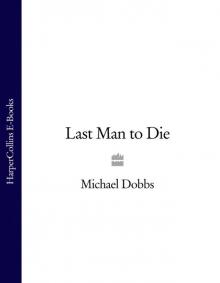 Last Man to Die
Last Man to Die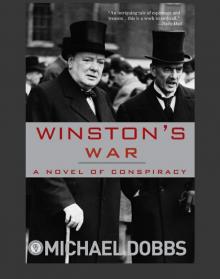 Winston's War
Winston's War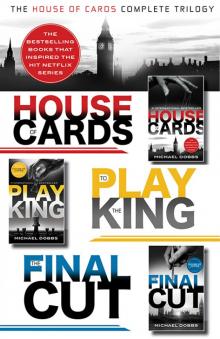 The House of Cards Complete Trilogy
The House of Cards Complete Trilogy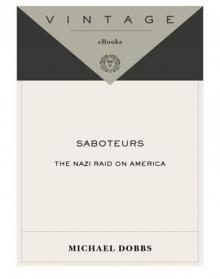 Saboteurs
Saboteurs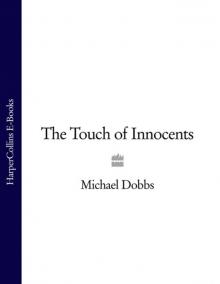 The Touch of Innocents
The Touch of Innocents WC02 - Never Surrender
WC02 - Never Surrender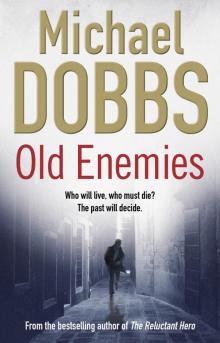 Old Enemies
Old Enemies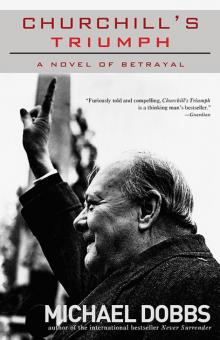 Churchill's Triumph
Churchill's Triumph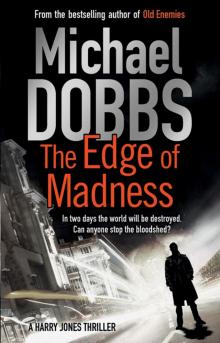 The Edge of Madness
The Edge of Madness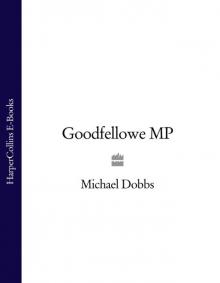 Goodfellowe MP
Goodfellowe MP The Final Cut
The Final Cut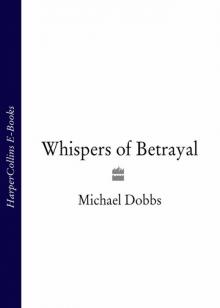 Whispers of Betrayal
Whispers of Betrayal Churchill's Hour
Churchill's Hour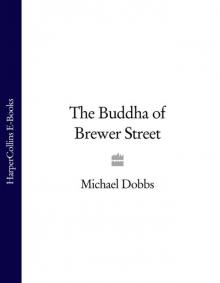 The Buddha of Brewer Street
The Buddha of Brewer Street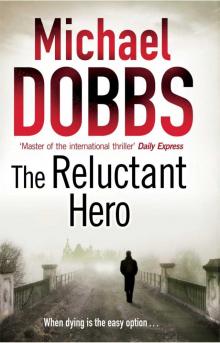 The Reluctant Hero
The Reluctant Hero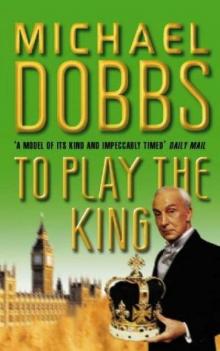 To Play the King
To Play the King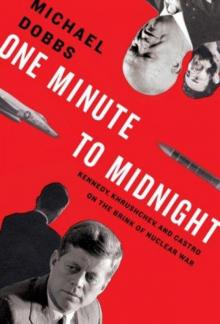 One minute to midnight
One minute to midnight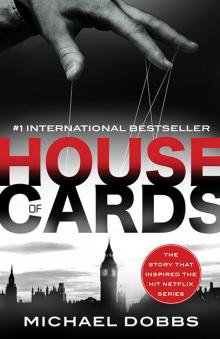 House of Cards
House of Cards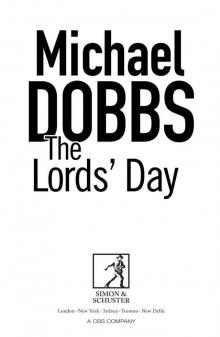 The Lords' Day (retail)
The Lords' Day (retail)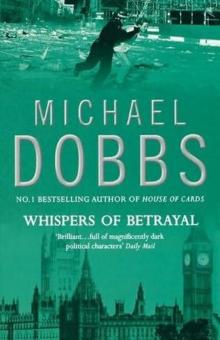 Whispers of betrayal tg-3
Whispers of betrayal tg-3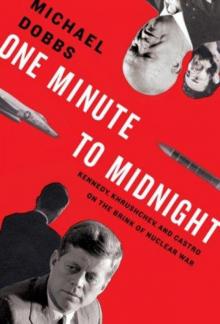 One minute to midnight: Kennedy, Khrushchev, and Castro on the brink of nuclear war
One minute to midnight: Kennedy, Khrushchev, and Castro on the brink of nuclear war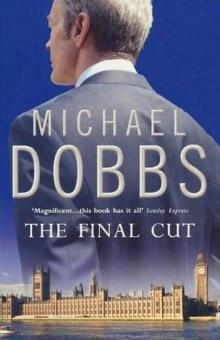 The Final Cut fu-3
The Final Cut fu-3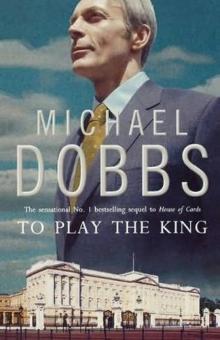 To play the king fu-2
To play the king fu-2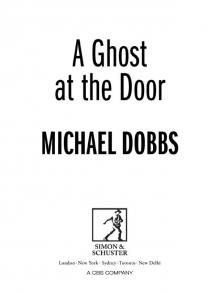 A Ghost at the Door
A Ghost at the Door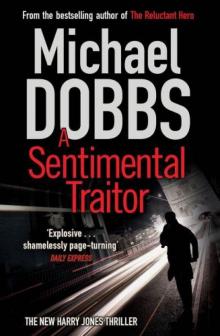 A Sentimental Traitor
A Sentimental Traitor